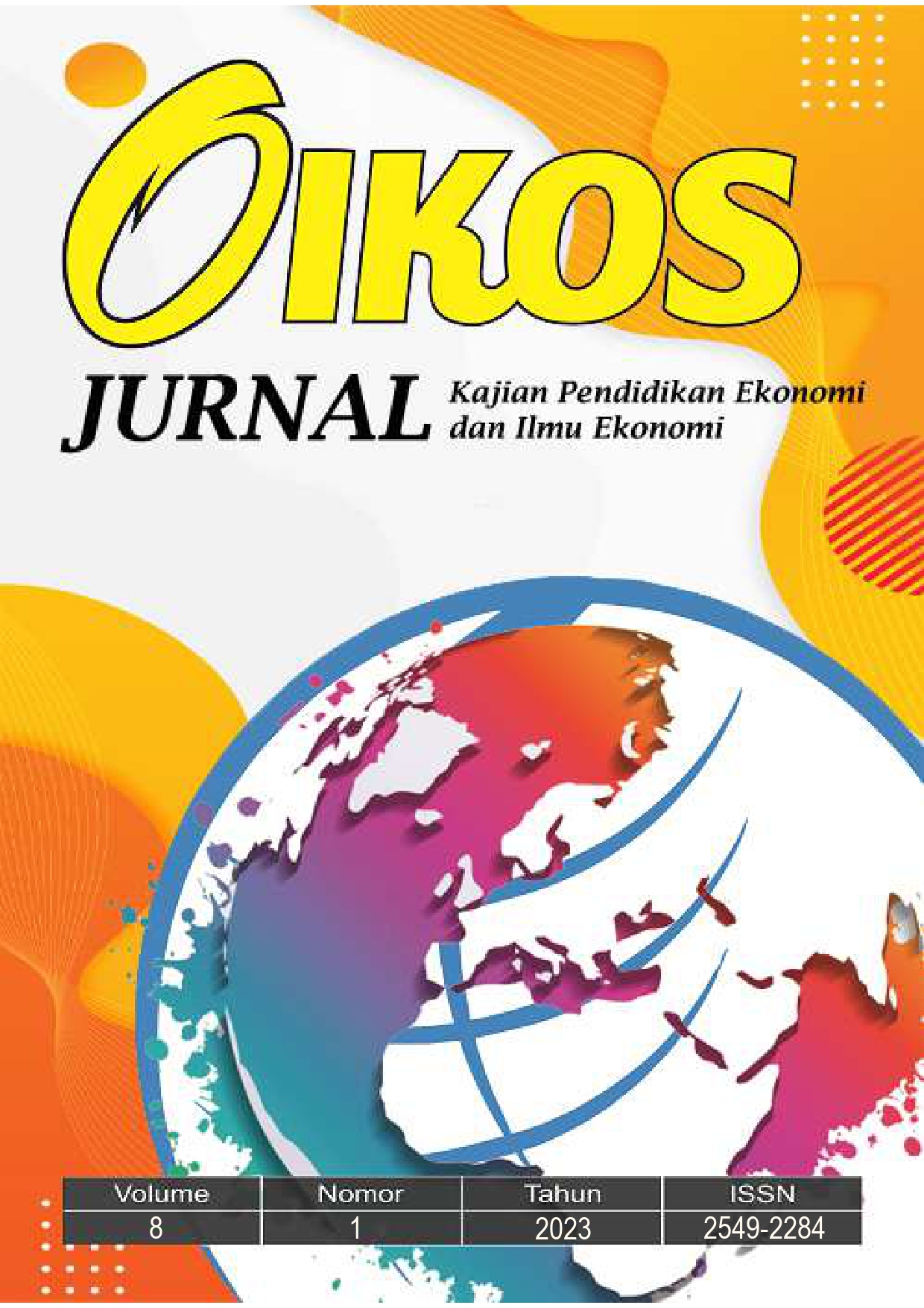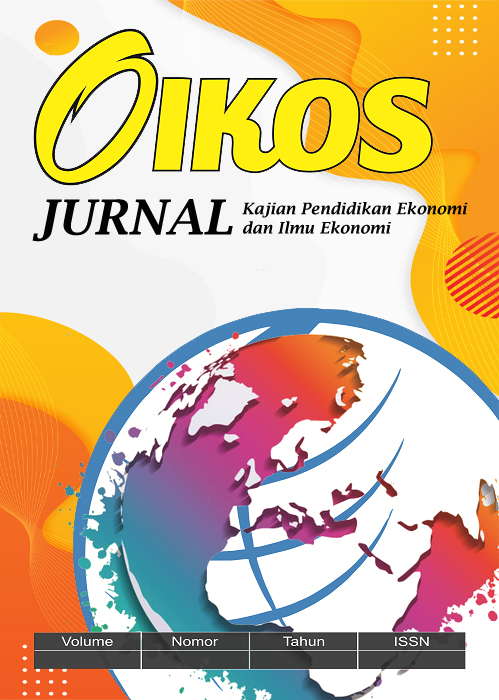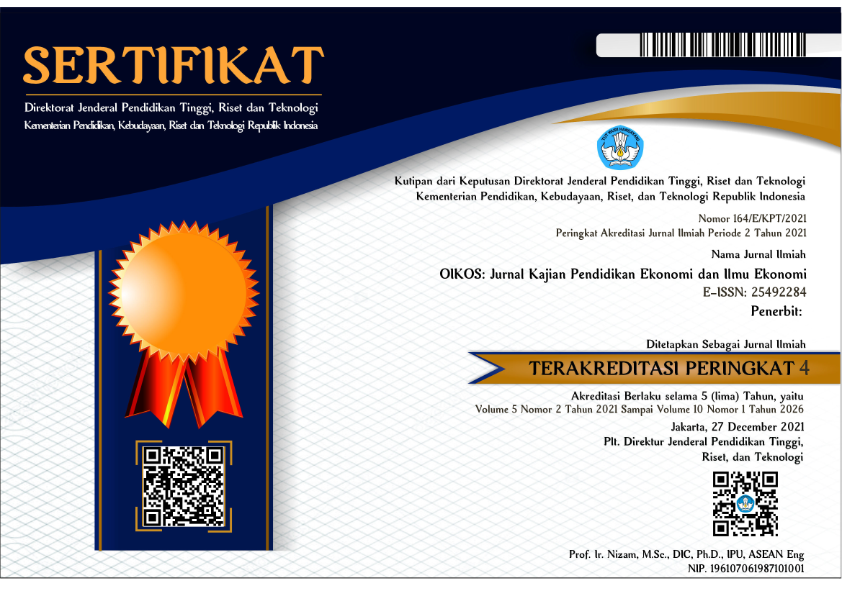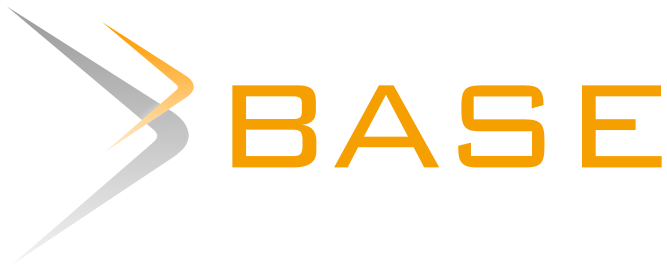Kemampuan Kolaborasi Wirausaha Mahasiswa Melalui Model Project Based Learning (PJBL) Menggunakan Platform babari.id Pada Sub CPMK Merencanakan Usaha Dengan Sistem Maklun
DOI:
https://doi.org/10.23969/oikos.v8i1.12228Keywords:
kolaborasi, kewirausahaan, project based learningAbstract
This research aims to determine the increase in students' collaboration skills through a project based learning model using the babari.id platform in Sub CPMK planning businesses using the maklun system. The research method used is experimentation with a pre-experimental design in the form of a one-shot case study. The population in this study were 5th semester students who were taking entrepreneurship courses at the Economic Education Study Program, FKIP, Pasundan University. The instruments used were initial and final observation sheets. Data analysis used descriptive statistics and inferential statistics, data processing used IBM SPSS Statistics 26. The research results showed that students' entrepreneurial collaboration ability through PJBL using the babari.id platform before treatment was 2.8, including quite good criteria, and after treatment it was 4. 2 is included in the very good criteria, with an average increase of 1.4. The T sig (2-tailed) test results were 0.00 < 0.05. So the hypothesis h0 is rejected while ha is accepted. In this way, there is an increase in students' entrepreneurial collaboration skills through a project based learning model using the babari.id platform in the CPMK sub-planning business using the Maklun system.
Downloads
References
Rose A, Snyder M, Murphy-Nugen A, Maddox G, Isaac MacKusic C, Molefe B. (2021). Cultivating Cross-Cultural Learning and Collaboration Among Special Educators Engaged in International Service-Learning. International Journal of Research on Service-Learning and Community Engagement [Internet]. 2021 Dec 30 [cited 2023 Apr 4];9(1). Diakses dari: https://ijrslce.scholasticahq.com/article/31307-cultivating-cross-cultural-learning-and-collaboration-among-special-educators-engaged-in-international-service-learning
Schunk, Daleh H. (2012). Learning Theories, Teori teori Pembelajaran: Perspektif Pendidikan. Pustaka Pelajar:Yogyakarta.
Casson, Mark. (2012). Entrepreneurship, teori, jejaring, sejarah. Raja Grafindo Persada: Jakarta.
Hyunhong Choi, Yoonmo Koo. (2023). New technology product introduction strategy with considerations for consumer-targeted policy intervention and new market entrant. https://www.sciencedirect.com/science/article/abs/pii/S0040162522006473
Kristine Bakkemo Kostøl & Kari Beate Remmen. (2022). A qualitative study of teachers’ and students’ experiences with a context-based curriculum unit designed in collaboration with STEM professionals and science educators https://diser.springeropen.com/articles/10.1186/s43031-022-00066-x
Roland Happ, Olga Zlatkin-Troitschanskaia & Manuel Förster, (2018). How prior economic education influences beginning university students’ knowledge of economics https://ervet-journal.springeropen.com/articles/10.1186/s40461-018-0066-7
Anne Valk&Mairit Kratovits. (2021). We collaborate with everyone, but with some more than others: evidence of stakeholder collaboration among internal security professional higher education institutions https://ervet-journal.springeropen.com/articles/10.1186/s40461-021-00110-6
Aulia Suminar Ayu, Prihatin Dwihantoro, I Gede Wyana Lokantara. (2020). Understanding Creative Economy Concept through Innovation Adopters Perspective https://journal.umy.ac.id/index.php/jkm/article/view/8394/5205
Heryani, dkk. (2020). Strategi Pengembangan Industri Kreatif Untuk Inovasi Creative Industry Development Strategy For Innovation; Jurnal Teknologi Industri Pertanian; ISSN: 0216-3160 EISSN: 2252-3901; diakses di https://journal.ipb.ac.id/index.php/jurnaltin/article/view/34744
Pratiwi, dkk. (2018). Penerapan Harga Pokok Penjualan dalam Sistem Informasi Akuntansi pada Industri Manufaktur Pakaian Jadi Menggunakan Jasa Maklon; Jurnal Telematika; ISSN:2579-3772; diakses di https://journal.ithb.ac.id/telematika/article/view/235
Alawamleh M, Francis YH, Alawamleh KJ. (2023). Entrepreneurship challenges: the case of Jordanian start-ups. J Innov Entrep [Internet]. 2023 Apr 5 [cited 2023 Apr 9];12(1):21. Available from: https://innovation-entrepreneurship.springeropen.com/articles/10.1186/s13731-023-00286-z
Ndofirepi, TM. (2023). Entrepreneurship goal and implementation intentions formation: the role of higher education institutions and contexts. J Innov Entrep [Internet]. 2022 Dec 29 [cited 2023 Apr 9];11(1):69. Available from: https://innovation-entrepreneurship.springeropen.com/articles/10.1186/s13731-022-00263-y
Hindi TN, Frenkel A. (2022) The contribution of collaboration to the development of sustainable innovation in high-tech companies. J Innov Entrep [Internet]. 2022 Nov 28 [cited 2023 Apr 9];11(1):62. Available from: https://innovation-entrepreneurship.springeropen.com/articles/10.1186/s13731-022-00259-8
Chaniago H. (2022). The effect innovation cloning to small business success: entrepreneurial perspective. J Innov Entrep [Internet]. 2022 Oct 5 [cited 2023 Apr 9];11(1):52. Available from: https://innovation-entrepreneurship.springeropen.com/articles/10.1186/s13731-022-00245-0
Sánchez‐Navarro JL, Arcas‐Lario N, Hernández‐Espallardo M. (2023). Identifying the antecedents of opportunism in agri‐food cooperatives: a comparative analysis between first‐ and second‐tier cooperatives. Annals of Public and Cooperative Economics. 2023 Feb 21; https://onlinelibrary.wiley.com/doi/full/10.1111/apce.12416
Mulyasa, E. (2014). Implementasi Kurikulum 2013. Bandung: PT Remaja Rosdakarya.
Hendro. (2011). Dasar-dasar kewirausahaan. Erlangga:Jakarta.
Downloads
Published
Issue
Section
License
Copyright (c) 2024 OIKOS: Jurnal Kajian Pendidikan Ekonomi dan Ilmu Ekonomi

This work is licensed under a Creative Commons Attribution 4.0 International License.









